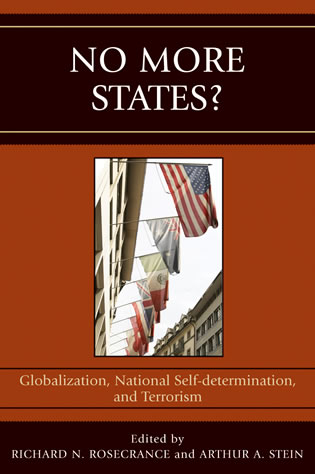
No More States?: Globalization, National Self-Determination, and Terrorism. Edited by Richard N. Rosecrance and Arthur A. Stein. Lanham, Maryland: Rowman & Littlefield Publishers, 2006.
The twentieth century witnessed an explosion of new nations carved out of existing ramshackle empires and multiethnic states. Many observers contend that the creation of new states will continue indefinitely, with the two hundred of today becoming the four hundred of tomorrow as more groups seek independence. This provocative and compelling book explores the impact of globalization and terrorism on this trend, arguing convincingly that the era of national self-determination has finally come to an end.
Examining the forces that determine the emergence of new nation-states, the distinguished contributors consider a rich array of specific cases from the Middle East, Asia, North America, Europe, and Russia where new states could be created.
They contend that globalization, rather than expanding such opportunities, is not as friendly to new weak states with limited resources as it is to established rich nations. Given the vast sums circulating in the world market, few fledgling nations can be financially independent. They find it more prudent to shelter within the protective embrace of existing federations. Equally, governments of federal states can induce restive petitioners—such as Quebec, Scotland, and the Basques—to remain inside the metropolitan boundary through a system of tangible restraints and rewards. Those who reject the benefits, such as rebels in Chechnya and Aceh, will fail in their bids for independence. Taiwan—poised on a knife-edge between integration with China and independence—faces a series of costs and diminished returns if it seeks full statehood. Finally, terrorism has lost its legitimacy as a technique for gaining independence in the eyes of the international community.
Despite the stall in new state formation, there has been no sign of successful military or imperial expansion by established countries toward consolidation into fewer, larger national units. Neither aggression by regional states—such as the Iraq invasion of Kuwait in 1990, nor intervention—such as the U.S. occupation of Iraq in 2003, are likely to succeed. On balance, the book concludes, discontented national movements will have to find ways to exist within current geopolitical boundaries.
REVIEWS
"This exceptionally well-researched collection of essays is the outcome of the UCLA-Harvard project on the likely creation of new states in the era of globalization. Rosecrance and Stein do an excellent job in summarizing the findings of three major conferences on the impact of globalization on the international system of states. Highly recommended."—Choice
"For 500 years, as empires fell and fiefdoms vanished, the nation-state has proven an evolutionary winner—its number soaring from 50 to 200 since World War II. Will globalization and integration, nuclear weapons and terrorism, finally do it in? For some astute and surprising answers, read this excellent collection."—Josef Joffe, publisher-editor, Die Zeit; Abramowitz Fellow, Hoover Institution, Stanford University
"An outstanding collection of essays on the deepening of economic globalization and its impact on nationalism, state formation, and stability in the international system."—T. V. Paul, McGill University
"Richard Rosecrance and Arthur Stein deal with one of the most important and understudied issues in global politics today—the question of state fragmentation and state formation. The chapters in this volume provide fresh thinking on why states exist and how they are defined."—Francis Fukuyama, Johns Hopkins University, author of The End of History and the Last Man
TABLE OF CONTENTS
Part I: Generalist Forces
 1 Globalization and
Its Effects: Introduction and Overview
1 Globalization and
Its Effects: Introduction and Overview
Richard N. Rosecrance, Etel Solingen, and Arthur A. Stein
2 The "Acceptance" of Globalization
Luisita Cordero and Richard N. Rosecrance
3 Will Terrorism Defeat Globalization?
Deepak Lal
4 Terrorism, Overreaction, and Globalization
John E. Mueller
Part II: Specific Outcomes
5 Can China Be Effectively Punished through Global Economic Isolation?
Richard N. Cooper
6 Globalization, Terrorism, Self-Determination, and the U. S. Relationship with Russia
Graham Allison
7 Globalization and the State in the Middle East: Iran, Turkey, Israel, and the Palestinians
Gitty M. Amini
8 The Failure of Chechen Separatism
John Reppert and Alexei Shevchenko
9 The Status Quo in Kashmir?
Deepak Lal
10 Global Incentives and Local Responses to Self-determination: An Application to Aceh
Etel Solingen
11 Mired in Mesopotamia? The Iraq War and U.S. Interests
Steven E. Miller
12 Sustainable Peace Agreements in the Age of International Institutions: The Case of Cyprus
Barbara Koremenos
13 The Never-Ending Story Quebec and the Question of National Self-Determination
Alan Alexandroff
 14 The Dilemma of
Devolution and Federalism: Secessionary Nationalism and the
Case of Scotland
14 The Dilemma of
Devolution and Federalism: Secessionary Nationalism and the
Case of Scotland
Arthur A. Stein and Richard N. Rosecrance
15 The Taiwan-China Tangle: Divided Sovereignty in an Age of Globalization
Richard Baum
Part III: Conclusions
16 Who Will Be Independent?
Richard N. Rosecrance